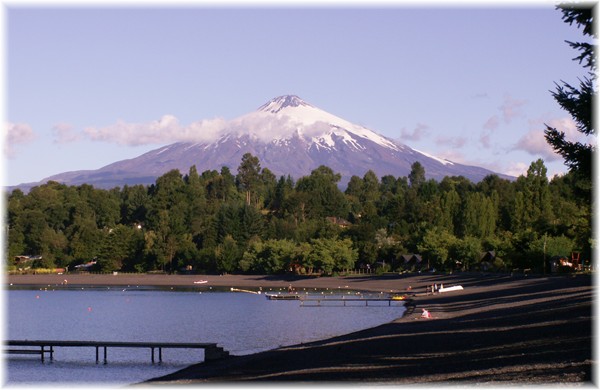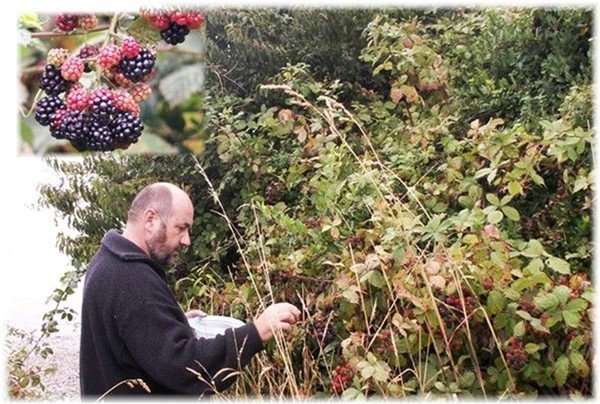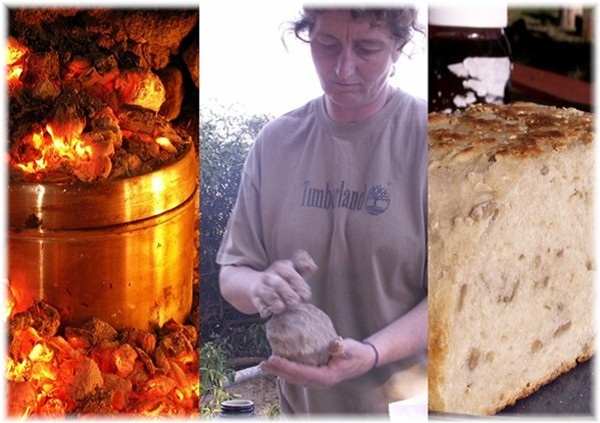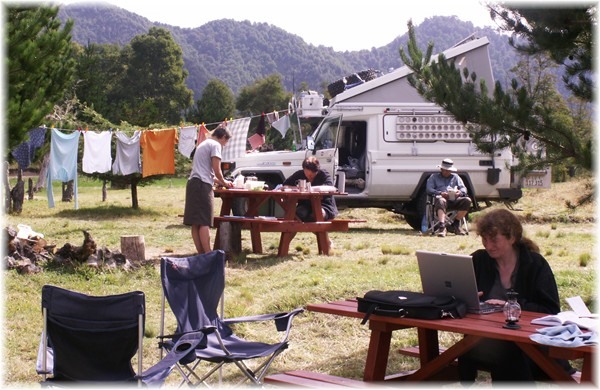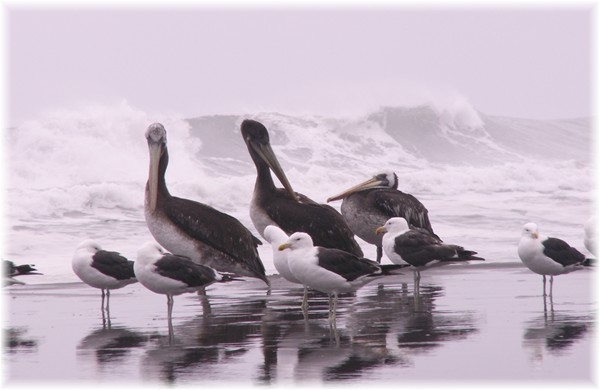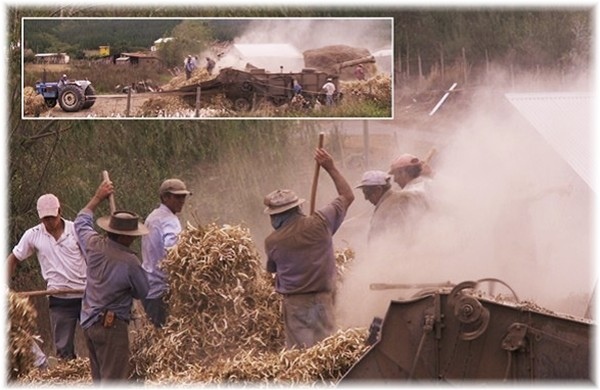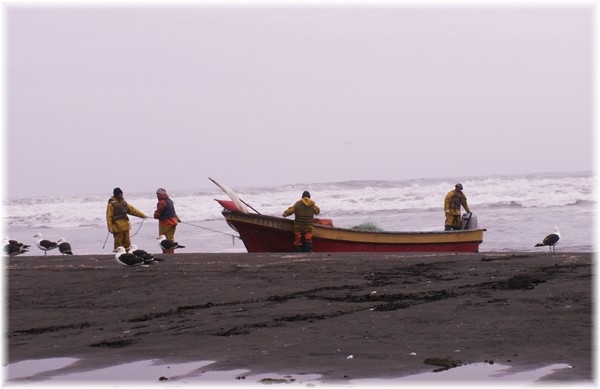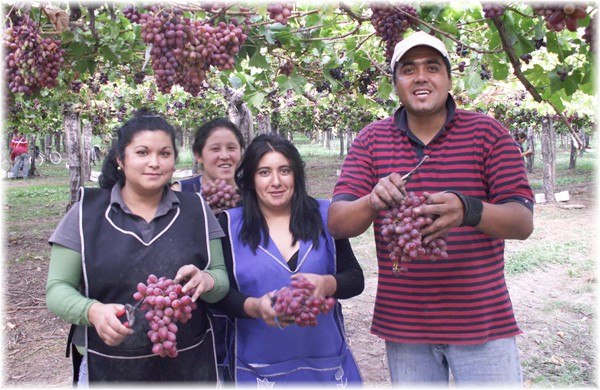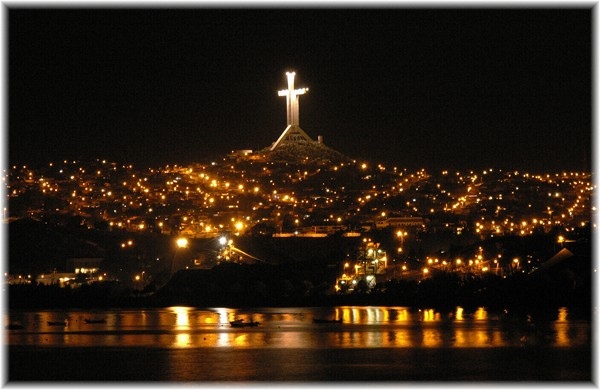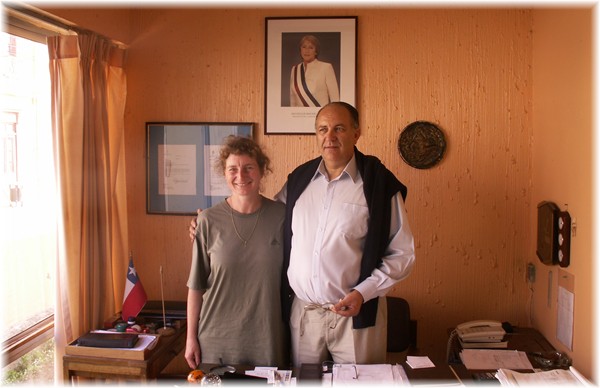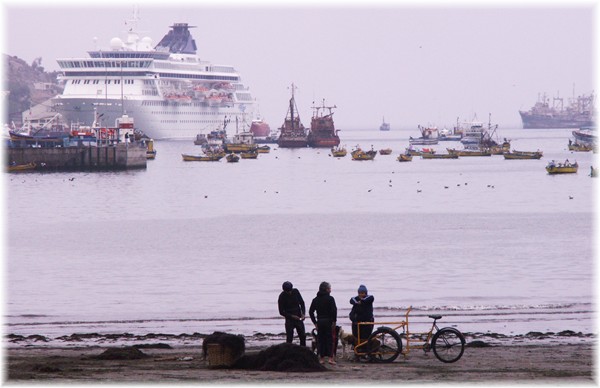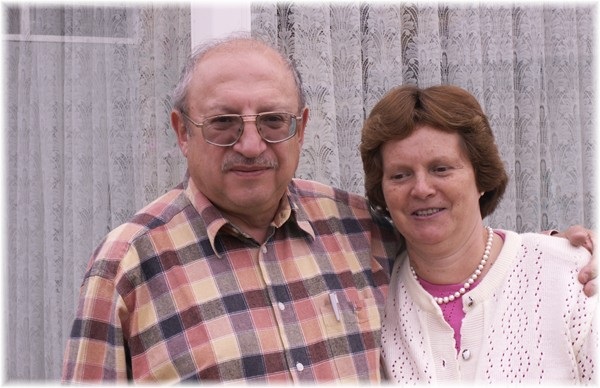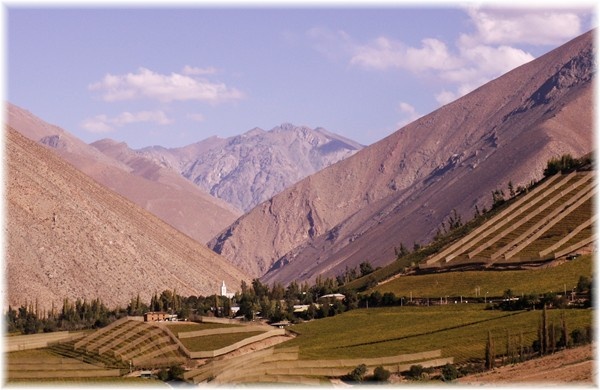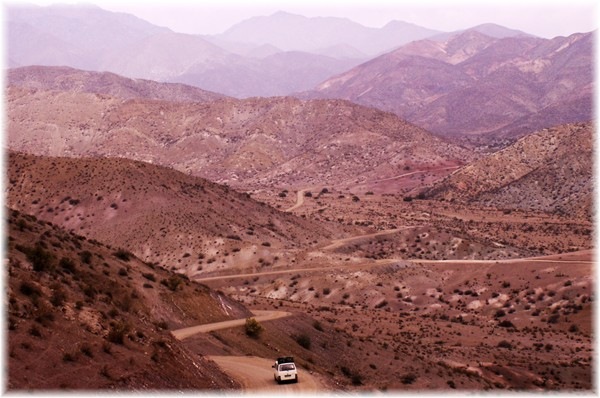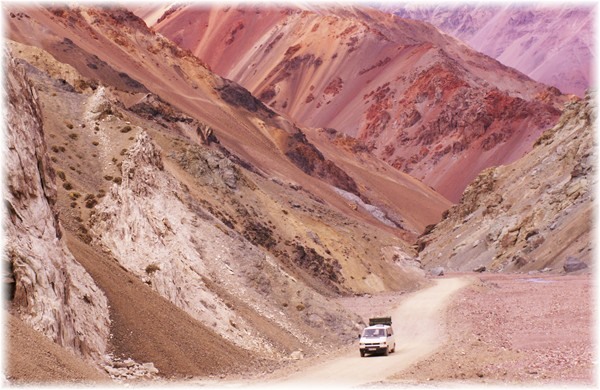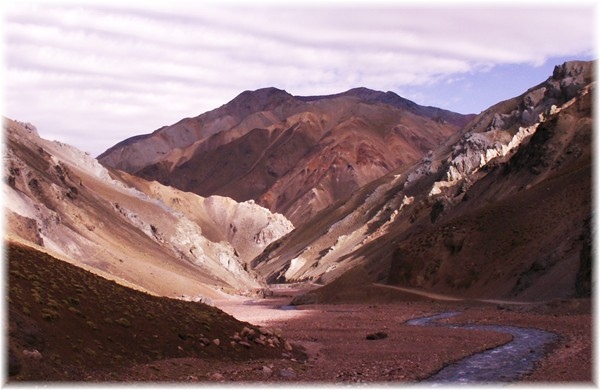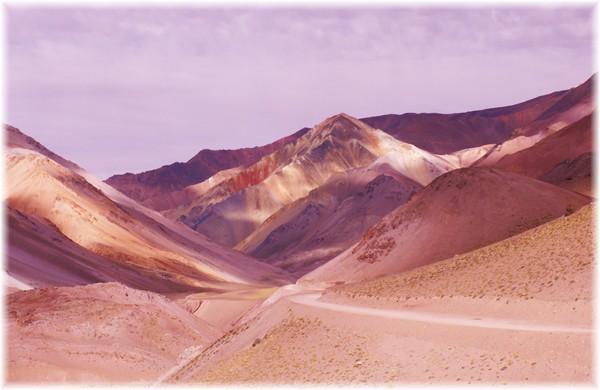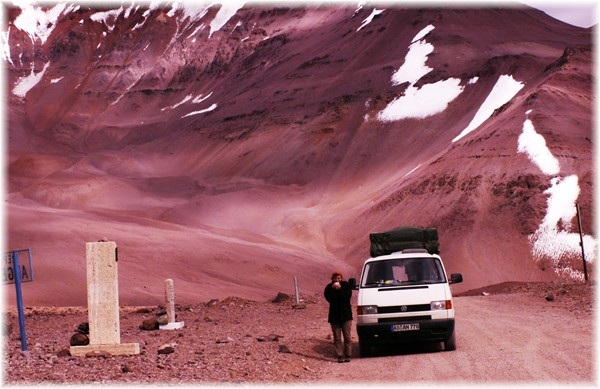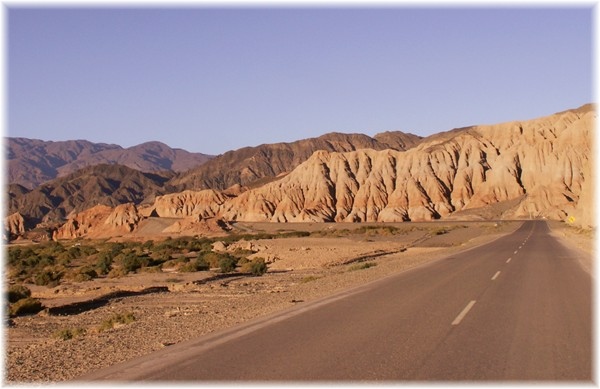The South-Autumn gets us quicker up North then we actually would like to do. The rainy season in the lake district has already started. The sunshades and deck chairs at the beach are already taken away. Just a few hotels and campgrounds are still open and there are nearly no holidaymaker to see. We are on a campground at the lake Lago Villaricca and imagine the lot´s and lot´s of tourists which have been here just two weeks ago. Now we are the only ones. Different then in Europe there is no early or after season here in South America. The season is just during the school holidays.
The trees, under which our bus is parked, gives us protection against the rain which we had the last two days. In that moment the weather will clear up again, we want to go further up north. Finally at day four, the weather changes, well up we go. After a few kilometres ride we can hear it again. This noise which bothered us already since last week. It comes and goes and we don´t know where it comes from or where it go´s to. It makes us nearly mad. It´s enough know, we want to know what it is. While Michaela is driving the bus, I stand on the bumper in the back and already after a few kilometres I can already locate, where it is coming from. I take away the back wheel and here I find the answer to the riddle, a broken spring. A shock for the first moment but we still can drive with the bus just not any more gravel roads. We find out the nearest dealer of VW in the nearby town of Temuco. He explain to us, that since last week he quitted the contract with VW and tells us we should try it in Puerto Montt which is 370 km far away from Temuco. We try it at another place in Temuco, who’s dealing with spare tools for different cars. He let us know, that this kind of tool we just will get over the head department of VW Chile which is located in Santiago, the capital of Chile. At least he gave us the telephone number of VW-Chile in Santiago. Later at the day, we find out that the number we’ve been given is wrong. So up to a telephone shop and we search through the huge telephone books. When we finally found the number and going to phone it, we have an answering machine on the other side, which tells us that we phone out of office time. Well we phone again next day. Next day the official in charge let us know, that this tool is just to be ordered directly from VW Germany and the time to be delivered will be about three weeks. We actually don’t want to wait that long, on top of it, if he tells us it need three weeks it can be that the actual time to be delivered is five weeks.
Here we are at a point, where we want to try another variation. We phone Christian, the brother of Michaela, and ask him, if he would be so kind to find out the price of the spring and the way of delivering. Immediately Christian is working on that problem and find out, that the spring can be delivered already in the next 10 days. Meanwhile we phone to the consulate general of the republic of Germany to ask, if we could use their address to let the spring deliver to. The lady at the phone tells us that in the moment the person which could answer to the question is not available anymore (it is Friday morning) we should phone again on Monday. Even after telling her, that it is quite important and necessary for us to have an address, she is not able to do anything for us. In that moment we are nearly at a nervous breakdown, since we did nothing than phoning and driving from one place to another the last two days. Keep cool and think over it! Next possibility is to phone to the consulate dignitaries of the republic of Germany in Vina del Mar. We phone and ask once again and immediately the problem is solved. Certainly we could send it to their address. We phone Christian and he informs us that the spring is already ordered and next day he will send the package out. Christian, we thank you so much for your prompt help! Our two families are just great!!!!
We are still in the lake district of Chile which is as well called the “Switzerland of Chile” In the last two centuries thousands of German and Swiss people have immigrated to this part of Chile, where before only the Indio’s called Mapuche have been living. The reason this part of Chile is called the “Switzerland of Chile” is that nature really looks a bit like Switzerland. Over 150 000 people, which have their roots in Germany or Switzerland are still living in this part. All over we can see signs with .”Kuchen y Strudel” (cakes and strudels), “Bier vom Faß” (beer of the barrel) or “Biergarten” (beer garden). We drive through the countryside. It is Autumn and therefore all over is harvest time. As well we pick blackberries along our way, since they are growing like mad. Not long and Michaela have done a few cans of fantastic marmalade out of blackberries.
Part of travelling is certainly to meet and get to know people. Via email we made up an appointment with Joli and Ingo, two Swiss which we already met in Usuhaia. We want to spent a few days together at the Hosteria La Suizandina, a Hosteria which is led by a Swiss family. On the campground which is part of the Hosteria we make ourselves comfortable. This time Joli and Ingo are not alone, Reni, the sister of Joli is travelling with them for the next two month through Chile. We do together some hikes in the wonderful forests full of trees of Araucarias. Some of the trees are more than a 1000 year old. In the evenings we cook together and the highlight of each day is to sit around a campfire till midnight while we tell each other stories. Reni and Michaela are preparing the dough for a bread which we then place in a closed pan in the embers of the fire. On top of the pan we place as well some embers.
Approximately after an hour the bread is finished. For tomorrow morning we have wonderful fresh baked bread. In the moment we still try different varieties and different wheat. Meanwhile we are already quite satisfied with our bread. There is not a real good bread to be found in Chile as well then in Argentina. Actually after a while as a German you can´t see anymore this kind of bread. Therefore it is not just fun to bake your own tasty bread with certainly lot’s of seeds and nuts. Even if it is sometimes quiet black, maybe that is the reason, that we call in Germany some of our bread black bread “smiley”
Since we are now together with Swiss people and are at a Swiss campground we think about to eat a typical Swiss dish. We reserve a table at the restaurant for Raclette (Swiss cheese dish). We never thought that we would find so much “Swiss” in the middle of South America. Every single day passes by so quick, that in the end instead of a few days we stay there over a week. There is simply to much to talk over. Joli, Reni and Ingo stay a few more days in the region of the Araucaria forest but we want to drive further up west to the Pacific. Suddenly the whole nature change face. The whole stretch the main colour was green, but from now on it is brown. Palm trees along the streets and a warm wind comes from the ocean. Shortly before sunset we reach the coast. It is already to dark to find a campground or a good place to overnight. So we place our bus at the beach next to a fishing village and hope that nobody will recognize us and we can sleep through the whole night. Till midnight everything is fine but then a bunch of young people comes to the beach and they start a midnight-disco-party. We in our bus are in the midst. The last are leaving the beach at sunrise and we are as well already awake. In this condition we start the new day along the coastline on red coloured streets.
Four ox carriages are coming in our direction, full of potatoes. It is Sunday morning, where do they go at this time of the day already. Well it is harvest time! At an old threshing machine we admire the work of the people, how they can work with all that dust the whole day through. Some of them wearing eye glasses and scarfs to protect themselves from the dust.
We drive further to Iloca, where we overnight, a small village situated on the coastline. In the morning the fishers are back from the sea. By using ox carriages the small boats are taken out from the water. To be more sufficient, the fisher smashes the crabs in the net with a kind of hammer. Just the fishes they will sell later on. For all the seagulls and the dogs it is breakfast time.
The whole village smells after fish. After half an hour, we are really fed up with the smell and we flee. Our way takes us through more villages, sometimes on asphalt, sometimes gravel roads. Often the gravel roads are in better condition then the roads with asphalts. Holes where one could disappear. Again the outlook of nature changes. We pass by fruit plantation, vineyards and in the midst very often grand mansions. This is truly a fertile region south-west of Santiago. For vegetarians the pure paradise. All what grows here is directly sold along the street. Nuts, grapes, tomatoes, potatoes, onions, lemons, oranges, dates, strawberries, sweet corn and so on. 4 Kilograms of Avocados for example are to get for the price of 1,40 Euro.
We want to visit as well one of the vineries. We drive along the vineyards and on our way we see lots of grape gatherer, mostly young people. They come towards our bus and look at it in astonishment. Lot’s of questions they have. In the end they cut some grapes and give them to us as a present. A meeting with heart!
Meanwhile some days passed and actually our tool should be already in Vina del Mar. Every day we phone to the consulate, just to get the information, that it is still not there. Since Easter is almost upon us we stock up our groceries and go for a few days to a campground, northwest of Vina del Mar, directly at the coast. Maundy Thursday – the spring is still not there. It would have been much easier to get the tool before Easter. On Good Friday we are very disappointed about the Roman-Catholics of Chile. Churches are closed and all shops are open. Julio, the owner of the campground tells us on Saturday, that the Easter weekend is just next week. Well this is the life of a traveller. After a while you have problems to know which day is today and you think it must be Eastern, instead Christmas is just upon us.
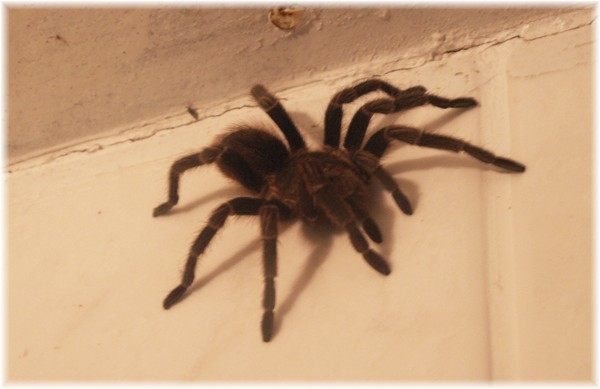
.... after „Esmeralda“ did show up on the toilet of the campground, Michaela did not have any more necessities.
Tuesday, finally a positive answer from the consulat. The spring is there. Up we go directly to Vina del Mar and back again to the campground. Same day we install it on the campground. Now we are prepared again for the gravel roads. Next day we go further on the Pan Americana towards the town of La Serena. It is already late afternoon when I realize, something is wrong with the gear stick. I try all of them and find out that I only can use the third, fourth and the fifth gear. Sh…. Till Coquimbo/ La Serena there are still 40 km to go with lots of up hills and latest in two hours it will get dark. None of us is talking, we both hope, that we can do the hills in front of us with the third gear and that we don’t get stuck in the middle of the street when it starts to get night. From the coast there is already the fog coming. Now we see in the far distance a cross. It is the cross of the “ Third century” of Coquimbo, which is standing on a hill with a height of 92 m
At the beginning of the town we first see a petrol station and go straight away there. With the bus we have to go up a lifting platform and then we can already see our problem – the reverse gear is broken. The mechanic from the petrol station informs us, that with this problem he is not any more able to help us. But he takes his phone and calls another mechanic which did not need longer then 10 minutes to appear. With the removed gear stick in his hand he disappear, just to be back half an hour later with the repaired one. For this action we pay approximately 15 EUR. Since it is already dark, the owner of the petrol station allows us to stay with our bus at the petrol station
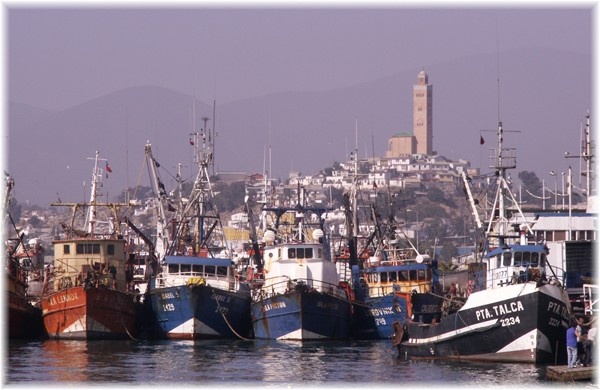
... Fishing boats in Coquimbo, in the back one of the two existing mosque which are existing in Chile
In the morning we decide to have breakfast in the small service room of the petrol station. We are not the only one there. In front of the Service room is parked a fire red Brazil-VW Käfer, which is an older model. The driver of this car sits in the service room, having breakfast and intensively reading his newspaper. That’s what we think. But he observe us as we can´t decide what we would like for our breakfast. That’s the moment he stands up, coming over to us showing us his plate and speak to us in English „ Would you like to have toasted bread like this, they are tasting very good“. That’s the beginning of a talk. He introduces himself as Oskar Fiedler und that he is the director of the culturhouse here in Coquimbo with it´s
160 000 inhabitants. He knows as well a few words in German since his father is born and grown up in Nuremberg but already living since 1930 in Coquimbo, Chile. He invites us to his office and tells about his work.
Oscar has a friend, Raul, which speaks fluent German. One phonecall and Raul comes along to the office and take a full day for us to show us the towns of Coquimbo and La Serena. Raul have been in the 1970th an active fan of Allende and had to leave Chile after the military revolt. From there he came to the exile to Germany. He tells us: “The Germans have been so nice and helpful to me, I want to give back just a bit from the help I received”. A farmers family have been taking care about him and adding him to their family. Raul: “Hans is like my brother” and between them is still the deepest friend(brother)ship. Raul did live in Germany over 30 years and did just out of health reason go back to the much warmer part here in Chile. Hans, Rauls brother is meanwhile the deputy mayor of Hannover.
Elisa, Rauls wife invites us on Easter Sunday for the afternoon tee. Together with their Spanish friends we have tea, cake and tart. Raul shows us the farewell present which he got from his friends in Germany as he left four years ago. It is a big map full with witnesses of the work he did in Germany. Raul was in his free time an active part of so many relief organizations and the founder of the Nicaragua relief organization. Raul really has a big warm heart and we are very grateful to get so much warmness from him and Elisa. On the next day as we had a problem with the garage, a phone call and he was in between five minutes with us. Dear Elisa and Raul, thanks so much for your kindness and your great hospitality!
Again it’s time to leave and to see new wonderful places. In La Serena we drive through the Valle d´Elqui, a very fertile valley, where along the river and at the watered mountain ranges fruits and wine are growing. Here as well the very well known Muskateller grapes grow, from which the Pisco, the Chilenean national drink is made.
Our goal for today is to reach the neighbour valley, called Valle del Rio Hurtado, where we hope to meet our Swiss friends. They as well wanted to drive there. In our map the street is marked as a tiny street, which connects this two valleys. We dive into another world, where other then the desert mountain range, cactus, dust and heat nothing else is to be found.
After two and a half hours driving time and shortly before sunset we reach the Andes-farmer village of Hurtado. Now there are just a few kilometres more to go to the Hacienda Los Andes. Joli, Reni and Ingo arrive next day. Even if we just spend one day together, we are very happy to see each other and have plenty to talk about. The three have planned quite a lot, since Reni have to go back to Switzerland already in three weeks.
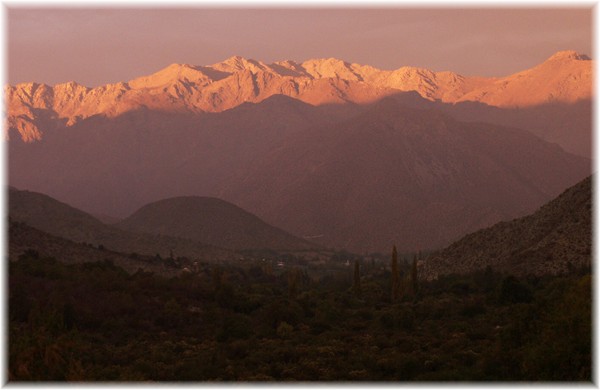
... shortly before darkness we reach the Andes-farmer village Hurtado in the fertile valley with the river Hurtado
After six weeks it is time for us to change the country again. We want to go to the north of Argentina and the shortest way is over the Andes-pass Agua Negra. The altitude of the pass is as well the actual border between Chile and Argentina and lies 4779 m above sea level. It is only opened between December and May. In the South-Winter month it is closed, due to heavy snowfalls. We drive to the end of the Valle del Elqui, where we do a check on our bus, to prepare for the height. Air, water and oil as well then an ant frost addition for our Diesel petrol to make sure we will not have problems up there when it is cold during the night. The Chilenian border control lies at the very end of the valley at a height of already 2000 m and 100 km before the actual border. As well the Argentinean border control is 80 km away from up there. The officer want to know, if we plan to overnight up there or if we go directly to the Argentinean border control. This information will then be passed over to the Argentinean border. Should we not pass in time there, they will look for us. There are often landslides and as well travellers which have problem with the height, the so called PUNA.
In the beginning the street is winding like a snake up the hill on good gravel roads and we hardly recognise that we win in height.
The colours of the rocks are changing very often in all different kind of varieties. There is ochre, chimney-red or a wonderful green.
The colours are even stronger with the last sunbeams and we are just in time at the Laguna for our overnight place. The day says good bye to us with a fantastic sky full of stars and it is so silent up here at a height of 3000 m that you can hear your own blood circulation. During the night it did not get cold like we though. In the morning we both have a bit of head-ache, the first symptoms of the PUNA. We drive further on through the valleys up there, wherever we look, just mountains. We do have the feeling that we are totally alone somewhere on the Mars.
In the far distance we see a car causing a big stir. Yesterday we saw a car and today already three cars. The first snow fields, our altimeter shows 4000 m. We still have to do 779 m and now we can already feel that even for our bus it is quiet hard to manage. In this height, where the oxygen is quiet less it is hard for the engine. Hopefully “HE” will manage it. In the last part the gravel road gets up quicker then yesterday. If you now look down, the mountains are falling vertical 800 m down. Finally we are at the pass, 4779 m high and the border between the two countries. Other then a few rocks done like a monument and signs showing Chile and Argentina, there is nothing more. Michaela wants to drink her cup of tea up here, but the wind is so strong, that she decides to fulfil this in the warm and wind still bus.
Michaela’s headache is gone. With me a further symptom of the PUNA comes to it: nausea. That’s the reason we go down as quick as we can do. 80 km just down, now on the Argentinean side. Towards the border control. I swear to myself, that in the near future I will not do another pass over the Andes. With every meter going down I feel better. This side of the Andes is not as nice as on the Chilenian but still beautiful. At the border we are already expected. “Ah, the two Germans are here”. One short remark to the two border controls: Both of them have been very nice and official other then we had it another time. In the next village called Rodeo we first did go on a campground for the next two days to get new power from that real tiring way over the Andes.
With beer and wine in the evening we already plan our next passing over the Andes. But now we want to stay here in Argentina where we realize, that the climate is different, it is hot – but about that you get to hear in our next report
Michaela and Raimund

